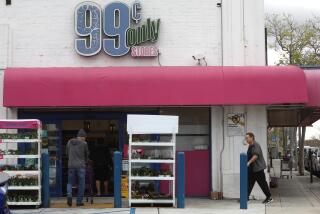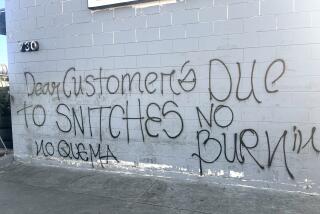Founder’s Death Raises Questions on Tire Firm’s Future : Burbank: Chief executive of the 172-store Winston chain predicts no immediate changes, but the company could draw buyers if put up for sale.
- Share via
The death of Sam Winston, founder of the Winston Tire Co., leaves his heirs facing a painful, but classic business textbook problem: what to do when the most prominent figure in a family-owned business dies.
For now, the Winston family’s answer is to do nothing. “In the near future I see no significant changes at all” in the company, said Tom Bonburg, 46, Winston Tire’s chief executive, who was recruited to the company by Sam Winston in 1990.
Although Sam Winston was synonymous with his company, in recent years it was Bonburg who ran the Burbank-based company, while Winston indulged in his hobbies of big-game hunting and the outdoors. “Sam hadn’t been involved in day-to-day operations for several years,” said Lloyd Greif, an investment banker with Greif & Co. in Los Angeles.
One immediate problem, though, is how to alter the company’s long successful ad campaign that featured Sam Winston as the firm’s main pitchman in TV commercials and other ads. Bonburg said the company would tackle that problem soon.
Winston, 54, died two weeks ago in Utah, after being thrown from a Jeep that went out of control with his wife at the wheel.
Winston left behind one of the largest independent tire store chains in the country, with 172 Winston stores in California and with estimated annual sales of $140 million. If the Winston family eventually puts Winston Tire up for sale, “I don’t think there’d be any shortage of interested parties,” Greif said.
Whoever runs Winston Tire, their challenge is to keep pace in a highly competitive business where profits are slim, if any. Winston Tire’s reputation was also marred by a 1993 state investigation, which found that some of Winston’s stores made unnecessary car repairs.
In its 1994 fiscal year, Winston Tire posted a $647,000 loss on $134.9 million in sales, compared to a $1.2-million loss on $147.7 million in sales in 1993, according to Dun & Bradstreet. In its latest fiscal year, Winston Tire has been profitable, Bonburg said.
Winston Tire’s sales were hurt after an investigation by undercover agents from the Department of Consumer Affairs who took cars in top condition to various Winston stores and said they were overcharged an average of $125 for unnecessary parts and service.
In 1993 Winston Tire agreed to pay $1.4 million to settle the case, including reimbursing $450,000 to 20,000 customers without admitting any wrongdoing.
The consumer case hurt Winston Tire, Bonburg concedes, but he says the company has set up various consumer protection programs as a safeguard.
Despite that setback, “Winston Tire still has a tremendous share of the L.A. market,” said Lloyd Stoyer, editor of the trade publication Modern Tire Dealer in Akron, Ohio.
The Winston tire brand, which is actually manufactured by Cooper Tire, remains the best selling private label tire brand in Southern California, Stoyer said. And Winston Tire is one of the four dominant tire store chains here, along with Parnelli Jones, Discount Tire and 4-Day Tire, Stoyer said.
The tire business remains tough going, partly because tires last longer and because retail tire prices have hardly budged in a decade. “In the tire business the profit is virtually eliminated,” said Bruce Douglass, founder of Reddi Brake Supply Corp., an auto parts concern in Ventura that counts Winston as one of its big customers.
So in the past decade Winston Tire has shifted to doing more wheel alignments and shock absorber and brake repairs. But other automotive chains have made the same move. The car repair business “has been a struggle,” Douglass said.
California’s soft economy has also made it “a very difficult state to conduct business in,” Bonburg said. “But I think we’ve weathered through it in pretty good shape.”
Sam Winston owned 87.7% of Winston Tire Co., according to Dun & Bradstreet, with 10.8% of the firm owned by his children’s trusts. Bonburg says that Winston’s two children do some marketing work for the company and that Winston’s widow, Demetra, is on the company’s board of directors.
Although Winston Tire remains in family hands, Sam Winston came close to selling the company in the late ‘80s.
If Winston’s heirs decide to sell, Big O Tires Inc., a chain based in Englewood, Colo., with more than 400 franchised stores in seven states, might be a possible buyer, Greif said, as might a European or Japanese tire company. “When you talk about 170 [Winston] store fronts, that’s pretty substantial distribution” for any company looking to market its tires, he said.
How much is Winston Tire worth? One indicator might be Big O Tires, whose sales nearly match Winston’s and is being bought by a management group for $54.7 million.
But given the low profit in the automotive business, Douglass thinks that Winston Tire might be easier to sell in pieces.
Two possible suitors, he suggests, are the Parnelli Jones Inc. tire chain, based in Ventura, with 50 stores in California, and Les Schwab Tire Centers, based in Oregon, with 260 stores, mostly in the Pacific Northwest. Douglass speculated that Les Schwab might buy some Winston stores in Northern California, and maybe Parnelli Jones would snap up some stores in the southern part of the state.
For now, though, the company remains as Sam Winston left it. The company’s legal name is still Oliver & Winston Inc., a throwback to when Winston and his stepfather Ray Oliver started selling tires wholesale in 1962.
Winston Tire started slowly. But in 1971 Winston began selling his own tire brand, and as Winston’s folksy manner in TV commercials caught on, the company grew quickly. “TV made him in that business. He had a knack for doing corny stuff in ads, but it worked,” Stoyer said.
Although Winston was known from his TV commercials, he didn’t particularly enjoy being in them. “Sam could get wound up talking about tires and about hunting,” Stoyer said. “But in a group, he was always the quiet guy. He was really low key, almost shy.”
More to Read
Inside the business of entertainment
The Wide Shot brings you news, analysis and insights on everything from streaming wars to production — and what it all means for the future.
You may occasionally receive promotional content from the Los Angeles Times.










